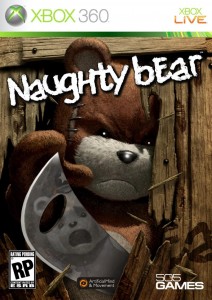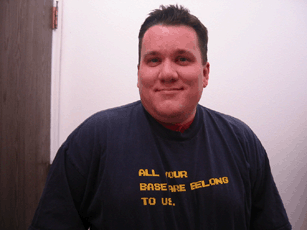![]() Topics in gaming news debated by GameCola writers and industry professionals.
Topics in gaming news debated by GameCola writers and industry professionals.
In this edition of “Versus Mode” we have:
ADAM RYLAND VS. STEVE HAMNER
Adam Ryland is a Lead Designer with Grey Dog Software, a Phoenix, Arizona-based developer of sports-management simulation computer games. In this capacity, he designs and develops MMA and pro-wrestling management simulators, in which players get to own and operate their own companies—hiring and firing fighters and wrestlers, putting together matches and big pay-per-views, dealing with injured and obstinate performers, and doing just about everything else related to running one of these organizations. Prior to joining Grey Dog, he also developed the freeware Extreme Warfare line of pro-wrestling sims. This is his second appearance in “Versus Mode,” having written previously with Colin Greenhalgh.
Adam’s latest title, World of Mixed Martial Arts 3, was released just last month, and you can check it out here on Grey Dog’s official website.
Steve Hamner is a former GameCola staff member who wrote reviews as well as “The Vanai’diel Diaries,” a series of journal-style articles chronicling his adventures in Final Fantasy XI. He is currently the co-host of the Liquid WoW podcast, a World of Warcraft-centric show geared toward casual and social players. This is his fifth apperance in “Versus Mode,” having written previously with Neal Iannone, Eric Regan, Casey Levine, and Eric Regan again.
1. Single-player games are “finished.”
Adam Ryland: Not being much of a gamer, I actually had my first experience of online multiplayer gaming just a few weeks ago. Playing Red Dead Redemption, I had visions of forming a posse and sweeping through towns together, riding the bad guys out of town before relaxing with a few hands of poker and some wenches; instead, my first go lasted around twenty seconds, which is how long it took another player to shoot me with a rifle. I gave him the benefit of the doubt; perhaps I had merely gotten in the way of a stray bullet. A point blank stray bullet. My second go was slightly more successful, but only because it involves me actually moving a few feet further down the road and whistling for my magnificent steed (well, donkey) before being once again gunned down in a hail of bullets. After about an hour and roughly 84 deaths at the hands of vastly better-equipped veterans with apparently nothing better to do than shoot rookies for poop and giggles, I went back to the single player mode instead. The point being that as long as online modes are dominated by ass-clowns, single player modes will continue to be popular.
Steve Hamner: I sure as hell hope not. While the majority of my gaming takes place in MMO-space these days, some of the most rewarding gaming experiences I’ve had this year have been me and me alone at the helm. Mass Effect 2, the single-player campaign of Halo: ODST, Red Dead Redemption, Fable III, The Sims 3, and Civilization V are all great examples of single-player gaming. Even though many of them have a robust multiplayer component, and that’s a huge selling point, the single-player campaign is why I bought and played the game.
Legions of gamers, myself included, relish the me-against-the-machine experience single-player gaming provides, and until MMOs enforce role-playing, odds on you’ll never get even an immersive RP experience in a multiplayer game. Single-player gaming isn’t going anywhere.
2. Companies shouldn’t release games if they’re bad.
Adam: I think that goes without saying, but it should also be extended to include lazy sequels; the only thing more frustrating than a bug-ridden game is paying for a sequel that quickly becomes  exposed as being virtually identical to the previous version except with roster updates and a few new graphics.
exposed as being virtually identical to the previous version except with roster updates and a few new graphics.
Steve: Damn right. I’m willing to forgive a bug, a balance issue, or something of that nature if it’s something the developer patches promptly. However, if a developer produces a hack-job game, charges me $60 for it and then shrugs at the outcry from the gaming community regarding the myriad shortcomings of the title while counting their cash, then I say suck it, Trebek. Get bent.
However, and this really hurts to admit, I can’t stand by my convictions. Electronic Arts, and other megacorp developers like them, have all the cards. I’d like very much to have an officially sanctioned hockey game from a non-EA developer, but since EA muscled studios like 2K Games off the map, it’s NHL 20xx or bust. I’d really like to give EA the finger and never buy an EA product again, but I know I will. I’ll get The Sims 3 expansions, I’ll get Mass Effect 3, and I’ll buy NHL 2012 next year. They have millions of us trapped, and they know it.
So while companies should never release a game that isn’t absolutely as good and as polished as it can be, large game houses make it really difficult to fight the power.
3. Everyone needs to start charging for online gaming.
Adam: Given my aforementioned Red Dead adventures as a human bullet depository, I can say with absolute certainty that I would have no interest in paying for online gaming. If I wanted to be shot at repeatedly, I could travel down to London and experience it in the flesh for free.
I think the current system or making money of DLC is a pretty good one, as it doesn’t alienate casual gamers. I think charging for all online gaming would just further concentrate the make-up of the online community into only the most hardcore gamers, making it very hard for newcomers to survive or thrive.
Steve: Yes. If for no other reason than I’m tired of owners of other gaming consoles getting away without paying an Xbox Live bill every six months. I’m actually shocked the manufacturers of other consoles haven’t gotten on board this train long ago. I pay my XBL Gold subscription without question and am happy to do so because of the multiplayer fun it will provide, and I’m just one of millions. I don’t know if it’s a case of everyone needs to start charging, but the day is coming soon when everyone will.
4. The used videogame market is hurting the gaming industry.
Adam: It’s hurting the profits of gaming companies, but it’s not hurting the industry itself—the very existence of a used game market supports a large number of casual gamers who don’t play games enough to justify paying the huge prices for brand new games, especially those games that only give a few weeks of gameplay before they become obsolete, and the industry would be in much worse shape without them. The used/second-hand product market is a part of a lot of industries, it’s simply a natural part of business.
Steve: I think that in the short term it does hurt the industry. Let me pose a hypothetical situation: I read about a game that came out six months ago—Super Karate Death Monkey. SKDM got great reviews, but it’s an older title. I hit GameStop and buy it used, saving myself $20. SKDM Studios doesn’t see a dime of that, leaving them a little less money to develop outside products, and forcing them to concentrate their resources on established franchises.
So I love SKDM. I run through the single-player campaign twice and get deep into the multiplayer. SKDM 2 is announced. I reserve the Collector’s Edition immediately, and cheerfully pay $80 on the midnight release of SKDM 2: The Reckoning. I’m now a lifelong fan of the SKDM series and will be buying every iteration of it until they put that monkey to bed.
I don’t think it’s a wash by any means. Harmonix and EA are probably gnashing their teeth over my previously-owned purchase of Rock Band 2. However, I’ve bought dozens of downloadable tracks for that game. Used games may be hurting the industry, but I think we’re talking flesh wound. DLC and the increase in customer base will see to it that the bleeding isn’t too bad.
5. Alan Wake is the best game of 2010.

Adam: Having played a grand total of three games this year (Red Dead, Arkham Asylum and the wonderfully crafted and internationally renowned World of Mixed Martial Arts 3), I am clearly in an excellent position to judge what the game of the year is.
Steve: I’m not at all qualified to answer this question, seeing as how I’ve never played it. I’ve always thought the label ‘Best Game of (Insert Year Here)’ is a joke. What yardstick does one use for that? Gaming, more than film or television, is very personal. Even if your avatar in the game is a speedy blue hedgehog or a mustachioed plumber, that is “your guy.” With that in mind, it’s impossible to objectively state that one game released in a 365 day period is superior to all others. My ‘Best Game of 2010’ is very probably not your ‘Best Game of 2010.’
But if you put a gun to my head, I’d take Red Dead Redemption over Alan Wake. I lived a spaghetti western, and it was magnificent, not to mention some fun multiplayer on the side. RDR was my own personal ‘Best Game of 2010’. Alan Wake may be outstanding, but it doesn’t sound like my particular brand of vodka. When considering a personal experience like a video game, ‘Best Game of 2010’ needs to be your ‘Best Game of 2010’; anything else is marketing.
To learn more about World of Mixed Martial Arts 3, Adam Ryland’s latest MMA-management sim, check out Grey Dog’s official website here.
To hear more from Steve Hamner, check out his World of Warcraft podcast Liquid WoW here, or check out some of his old GameCola articles here.



I want to go on record saying I greatly appreciate, and I mean this sincerely and not in the asinine way of which it will come off, that Adam did not fill his responses with plugs for his software like last time. That drove me nuts and since I left a negative message last time, I felt I should leave a positive one this time. Thank you Adam.
Good responses.